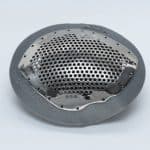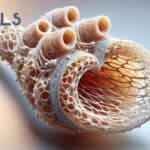
Richard Doerer is the Director of Technology at BioModel3D a Detroit based start-up segmenting and printing vascular, orthopedic, craniomaxillofacial and veterinarian models. He also is the Additive and Engineering Manager for Adient, LLC in automotive/airline seating in Plymouth, MI. Richard brings 25 plus years in product development, management and entrepreneurial start-ups that strived to create value by commercializing innovation, creativity and problem–solving for customers. He is a Yale MFA and Michigan State University MBA graduate.

Jenny: One quote that represents you.
Richard: “Learning never exhausts the mind”-Leonardo da Vinci. I just finished reading Leonardo da Vinci by Walter Isaacson. I was amazed at his sense of observation of the flow of water in nature in the
Jenny: Tell us a little about yourself. (Where are you from originally? Where are you located? What are you working on?)
Richard: Originally from Ann Arbor, MI. I moved to the Connecticut/NYC area in 1982 and lived on the East Coast till 2000. I originally started 3D printing, SLA, back in the late 1990’s for consumer products. Around 2010, I started printing for the automotive industry for automotive seating and concept cars. Currently, I am the Director of Technology for BioModel3D.com a start-up medical 3D printing company in Metro Detroit. Also, I am the Additive/Engineering Manager for Adient, LLC in automotive seating product development.
Jenny: What made you decide to become a 3DHEALS community manager?
Richard: There was a void in a sense of community in 3D printing for healthcare in Detroit. There are many universities, companies and investors involved in 3D printing technology for healthcare but we seemed to be in separate silos. Plus, I always admired the missions of 3DHEALS and saw an opportunity to work together to create a 3D printing healthcare community in Metro-Detroit.

Jenny: What do you think of innovations in healthcare 3D printing or bioprinting?
Richard: There have been great strides in bioprinting in the Detroit area. For example, Dr. Scott Hollister, formerly, of the University of Michigan was among the first to 3D print a bioresorbable tracheal splint into the bronchus of a 20-month-old baby to support his airway. Other labs are working on
Jenny: What do you hope to see in the next five years?
Richard: Well, I think we are beginning to see the acceptance and necessity of 3D printed models by Medicare and the FDA. Medicare has several CPT codes for medical models which should go into practice in 2020. This is huge, at our start-up BioModel3D, the first questions hospital systems ask us is who is going to pay for this? 10 years?
Jenny: If you have done 3D printing before, what have you made/designed? (Photos if available, preferably in healthcare application)
Richard: Our company BioModel3D segments and prints vascular, orthopedic, craniomaxillofacial and veterinarian models. (

Jenny: Most of our community managers are entrepreneurial and adventurous, what risks/adventures have you taken that you’d like to share with us?
Richard: I’ve done a number of start-ups. One successful, the others failed. After graduating from the art school at Yale, I was asked if I could teach a course on model building for architecture and art students at Yale. I agreed and shortly afterward launched a product development company. We were initially customer financed and later both customer and self-financed. We focused on models/products for architects, consumer products and demonstrative evidence for litigation.
Jenny: Any hopes or regrets?
Richard: No, but we learned if you have a huge scary opportunity as a start-up, go for it 110%. Don’t worry about the money. And if people are not eager to join your start-up it’s probably not going to work.
Jenny: Who would you like to find and to include in the 3DHEALS community you are building?
Richard: We would like to include universities doing research in bio-engineering, dental labs & dentists, hospitals that are or looking to print, specialists in vascular and orthopedics, investors, medical software companies, Women in 3D Printing-Detroit Chapter, 3D printing companies, law firms, insurance companies, entrepreneurial events, shared workspace hosts, MEDC, additive recruiters and school aged children in Detroit.
Jenny: What would you like to accomplish with this new 3DHEALS community in the future?
Richard: To drive awareness of the immense talent in Detroit and surrounding areas in 3D printing technology in healthcare. This community is here to support you and your company’s growth.

Jenny: What do you think about the innovation environment (for health tech or for general technology) in your city?
Richard: The innovation environment for healthcare in Detroit and surrounding areas is great. For example, Wayne State University, University of Michigan and Michigan State University are all leaders in bio-engineering research and bio-medical studies. Beaumont Hospital and Henry Ford Innovation Institute are leaders in cardiovascular printing technology. (Jenny): What can be done to improve it? Automotive has a standing happy hour/networking meeting every month at the Detroit Metro Airport. People in additive from Ford, Stratasys, Oerlikon, Chrysler, Adient, Siemens, GM and others all show up on a regular basis to talk shop. We can establish a similar venue(s) for innovation in healthcare in Detroit.
Jenny: What are you most proud of about your city?
Richard: The overwhelming entrepreneurial spirit in Detroit and the metro-Detroit area. Metro-Detroit including Ann Arbor, E. Lansing, and surrounding counties. Recently, I met an advertising firm that was moving to Detroit from Atlanta for entrepreneurial opportunities and investors. They saw opportunities besides automotive. It’s less expensive to live in Detroit and there are many incubator and accelerator programs in the city..
Jenny: What are you most proud of about the innovation community in your city?
Richard: The automotive industry drives a great deal of interest from the 3D printing companies.3D printing companies have a significant presence in Detroit and it will be great to get them more involved in healthcare.
Jenny: What do you think are the top priorities in healthcare innovations for your city/community?
Richard: I think I will find this out from the voice of the community. It is important to understand the behavior of the customer/community and make sure we are fulfilling their needs.

Jenny: What do you hope to accomplish through your role as the 3DHEALS community manager?
Richard: To drive an awareness to the various 3D healthcare groups and students that this community is a resource to help them find solutions to their needs. And let students know that there are enormous opportunities to stay in Detroit and launch their start-ups in healthcare technologies using 3D printing.
Jenny: What do you do for fun?
Richard: Build electronic props based on monster and horror films. Go to street festivals with friends.
Jenny: Anything else?
Richard: Read, walk my dog Dexter.




 Mar 09, 2019
Mar 09, 2019 






Comments